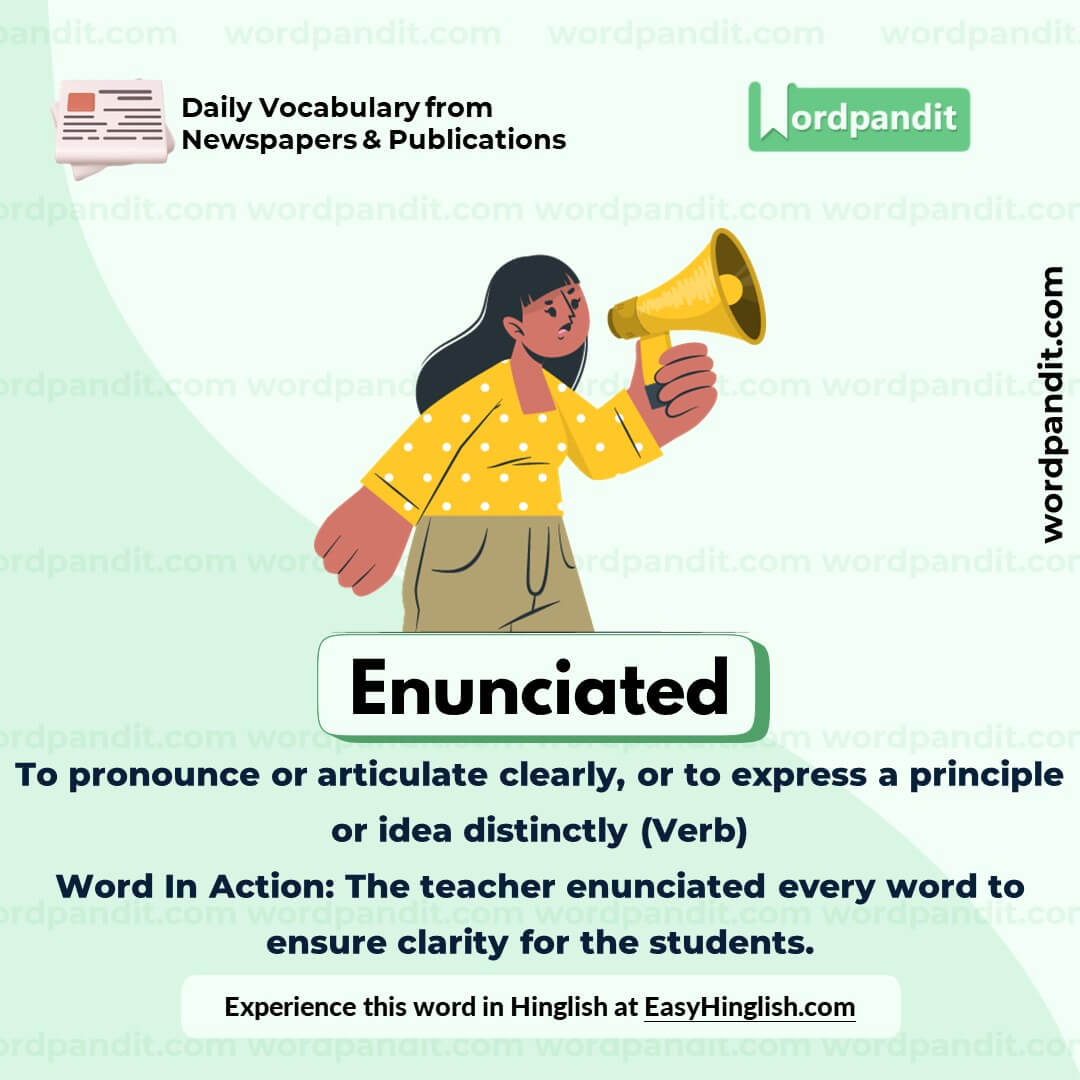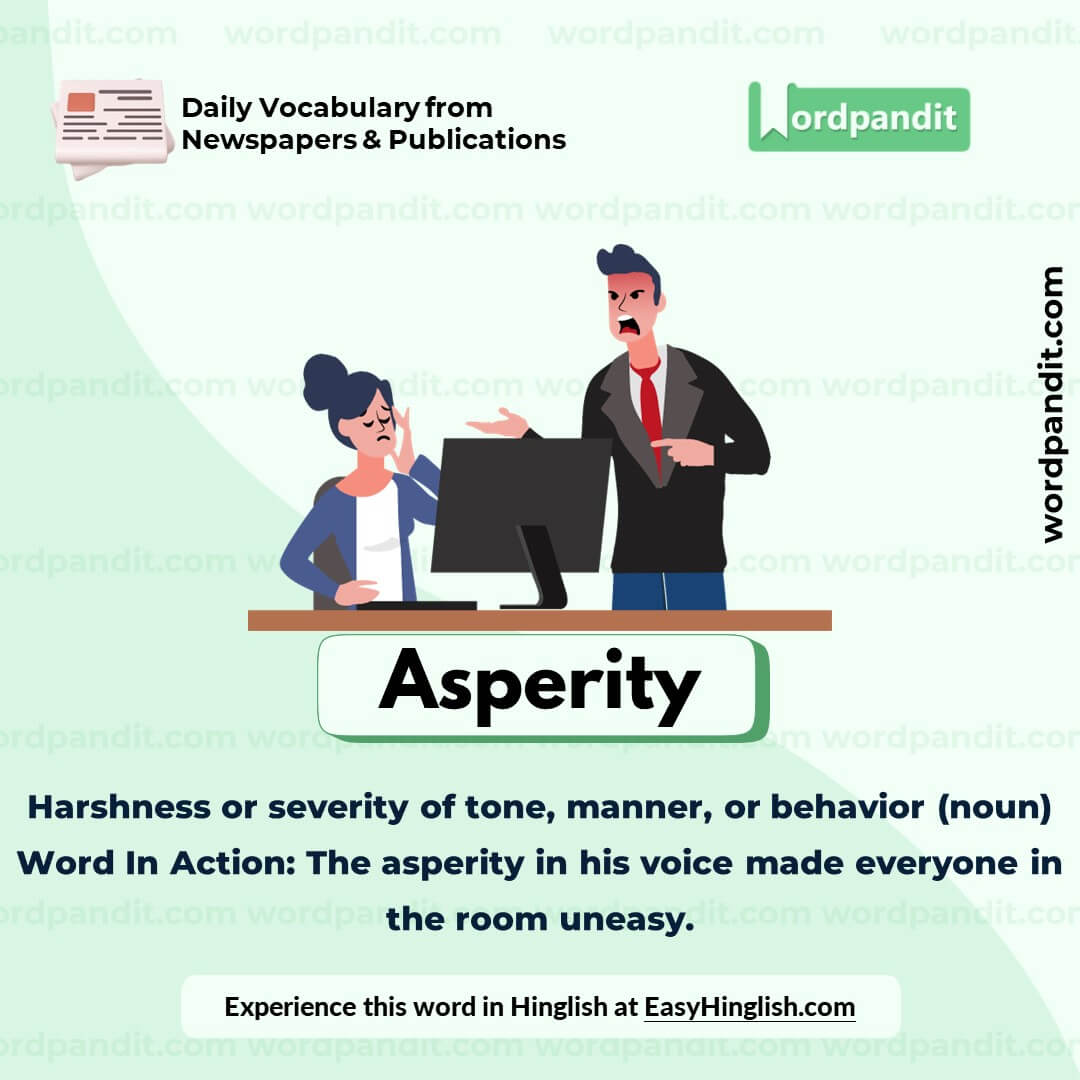Daily Vocabulary from Indian Newspapers and Publications
Welcome to Wordpandit’s Indian Vocabulary Hub
At Wordpandit, we understand the importance of staying rooted in the local context while expanding your language skills. This section focuses on enriching your vocabulary with words and phrases drawn from India’s leading newspapers and publications, ensuring you're learning vocabulary that is practical, relevant, and uniquely Indian.
Why Indian Sources Matter
We believe that the best way to master any language is by immersing yourself in local content. That’s why we carefully curate vocabulary from top Indian publications, including:
- The Hindu
- The Times of India
- The Economic Times
- Hindustan Times
- Live Mint
- The Indian Express
- And many others...
Stay Updated, Stay Relevant
With daily updates from Indian news sources, you’ll be consistently learning words that reflect the trends and shifts in Indian society and culture. Our focus is to provide vocabulary that enhances your understanding of the language in an Indian context.
How Wordpandit Supports Your Goals
Whether you’re preparing for exams, aiming to improve your professional communication, or simply want to stay connected with the latest Indian vocabulary, Wordpandit is here to guide you every step of the way.
Learn with a Practical Approach
Our interactive learning methodology includes real-world examples, engaging activities, and context-specific usage to ensure that every word becomes part of your active vocabulary.
Dive into Indian Vocabulary Today!
Why Choose Wordpandit?
Practical Learning: Focus on words you'll actually encounter in real-world reading, enhancing your comprehension and communication skills.
Diverse Content: From current affairs to scientific breakthroughs, our varied sources expose you to vocabulary across multiple domains.
Effortless Integration: Make Wordpandit a part of your daily routine. Just a few minutes each day can significantly boost your lexicon over time.
Your Path to Vocabulary Mastery
- Visit our Daily Vocabulary section regularly
- Explore new words and their usage in context
- Practice incorporating these words into your own writing and speech
- Track your progress as your vocabulary expands
Start Your Journey Today
Embark on your vocabulary enhancement journey with Wordpandit. By consistently engaging with our daily posts, you'll build a robust vocabulary that serves you well in academic, professional, and personal contexts.
Remember, a word a day keeps linguistic limitations at bay. Make Wordpandit your daily companion in the quest for vocabulary excellence!
WORD-1: Enunciated
Context:
"Attacked its framers for not including the laws enunciated in the Manusmriti which it claimed 'excite the admiration of the world and elicit spontaneous obedience and conformity.'" - The Wire
Explanatory Paragraph:
The word "enunciated" refers to the act of expressing or stating something clearly and definitively. In this context, it describes laws that were explicitly articulated in the Manusmriti, highlighting their clarity and significance.
Meaning: To pronounce or articulate clearly, or to express a principle or idea distinctly. (Verb)
Pronunciation: ee-NUN-see-ay-ted
Difficulty Level: ⭐⭐⭐ Intermediate
Etymology: Derived from the Latin word "enuntiare," which means "to declare or announce."
Synonyms & Antonyms:
Synonyms: Articulated, expressed, stated, pronounced, declared
Antonyms: Mumbled, murmured, omitted, misrepresented
Usage Examples:
- The teacher enunciated each word carefully to ensure the students understood the pronunciation.
- The president enunciated his vision for the country's future during his address.
- She enunciated her disagreement with the policy clearly and respectfully.
- In his speech, the lawyer enunciated the key principles of the case with precision.
Cultural Reference:
"The Declaration of Independence enunciates the foundational principles of liberty and equality." - This highlights how the term is associated with clarity and significance in historical texts.
Think About It:
Why do you think clear enunciation is so critical in legal, political, and educational contexts?
Quick Activity:
Write three sentences enunciating your opinion on a current event, ensuring clarity and precision in your language.
Memory Tip:
Think of "enunciated" as related to "announcement" — both involve clear and explicit expression.
Real-World Application:
The ability to enunciate ideas clearly is essential in public speaking, teaching, and any professional environment where effective communication matters.
WORD-2: Conformity
Context:
"Attacked its framers for not including the laws enunciated in the Manusmriti which it claimed 'excite the admiration of the world and elicit spontaneous obedience and conformity.'" - The Wire
Explanatory Paragraph:
The term "conformity" refers to behavior or actions that align with established rules, norms, or standards. In this context, it indicates adherence to the laws or principles of the Manusmriti, which are seen as evoking universal agreement and compliance.
Meaning: Compliance with rules, standards, or societal norms. (Noun)
Pronunciation: kuhn-FOR-mih-tee
Difficulty Level: ⭐⭐ Beginner
Etymology: Derived from the Latin word "conformitas," meaning "similarity" or "correspondence."
Synonyms & Antonyms:
Synonyms: Compliance, adherence, obedience, agreement
Antonyms: Rebellion, defiance, nonconformity, individuality
Usage Examples:
- The school's dress code ensured conformity among students in their appearance.
- Conformity to traffic rules is essential for maintaining road safety.
- The artist resisted conformity, choosing instead to pursue a unique style.
- Social conformity often dictates the way people behave in public settings.
Cultural Reference:
"Conformity is the jailer of freedom and the enemy of growth." - John F. Kennedy. This quote critiques the restrictive aspects of conformity.
Think About It:
Can conformity coexist with creativity and individuality, or are they inherently in conflict?
Quick Activity:
List three examples where conformity is beneficial and three where it may be harmful. Reflect on how societal norms shape your behavior.
Memory Tip:
Think of "conformity" as "conforming" to norms, just like a puzzle piece fitting into a predefined space.
Real-World Application:
Conformity is often observed in workplaces, where employees follow organizational policies and protocols to maintain order and consistency.
WORD-3: Asperity
Context:
"But, most often, you will see asperity used in reference to grumpy voices or irritable behavior." - The Wire
Explanatory Paragraph:
The word "asperity" refers to a harsh or severe tone, manner, or condition. It is often used to describe someone's sharp or irritable behavior, especially when they are speaking. The term can also denote roughness or harshness in physical or emotional contexts, emphasizing a lack of smoothness or gentleness.
Meaning: Harshness or severity of tone, manner, or behavior (noun).
Pronunciation: as-PAIR-ih-tee
Difficulty Level: ⭐⭐⭐ Intermediate
Etymology: Derived from the Latin word "asper," meaning "rough," "harsh," or "severe."
Synonyms & Antonyms:
Synonyms: harshness, acerbity, severity, irascibility
Antonyms: gentleness, kindness, softness, amiability
Usage Examples:
- The teacher's asperity in addressing the late students left them visibly shaken.
- The asperity in her tone made it clear that she was not pleased with the suggestion.
- Despite his asperity, his intentions were ultimately kind and constructive.
- The asperity of the winter wind bit through his coat and made him shiver.
Cultural Reference:
"Asperity is often highlighted in literary characters who are strict or harsh, such as Mr. Scrooge in Charles Dickens' 'A Christmas Carol,' whose asperity diminishes as he learns compassion." - Adapted Reference
Think About It:
Can asperity ever be justified as a form of discipline, or does it always cause harm in relationships?
Quick Activity:
List three scenarios where you have encountered or observed asperity. Reflect on whether it was effective or not.
Memory Tip:
Think of "asperity" as "a spear" in someone's tone or manner—sharp, pointed, and harsh.
Real-World Application:
Understanding asperity is useful in interpersonal communication and conflict resolution, helping you recognize and address harsh behavior effectively.
WORD-4: Denunciation
Context:
"Such denunciatory remarks of RSS in spite of the assurances of its chief M.S. Golwalkar on July 10, 1949, to Sardar Patel that it would respect the national flag and constitution of India reflected the shallowness of their commitments." - The Wire
Explanatory Paragraph:
"Denunciation" refers to the act of publicly condemning or criticizing something or someone in a strong and emphatic manner. In this context, it highlights the disapproval expressed through remarks aimed at the RSS, despite earlier assurances by its leader.
Meaning: Public condemnation or criticism of someone or something. (Noun)
Pronunciation: dih-nuhn-see-AY-shuhn
Difficulty Level: ⭐⭐⭐ Intermediate
Etymology: Derived from the Latin word "denuntiatio," meaning "a proclamation or formal announcement."
Synonyms & Antonyms:
Synonyms: Condemnation, criticism, censure, accusation
Antonyms: Praise, approval, commendation, endorsement
Usage Examples:
- The politician's denunciation of corruption gained widespread support among the public.
- Her denunciation of the policy highlighted its potential harm to marginalized communities.
- The writer faced denunciation from critics for the controversial themes in his novel.
- The organization's denunciation of the act was broadcast across multiple media channels.
Cultural Reference:
"The denunciation of apartheid by global leaders in the 20th century played a crucial role in its eventual downfall."
Think About It:
How do public denunciations influence societal attitudes towards individuals or organizations?
Quick Activity:
Write a brief denunciation of a fictional scenario where a public figure violates ethical standards. Use persuasive language to convey your point.
Memory Tip:
Think of "denunciation" as "denouncing" someone — both involve making a formal and public statement against them.
Real-World Application:
Denunciations are frequently used in politics, media, and activism to draw attention to unethical behavior or injustice.
WORD-5: Shallowness
Context:
"Such denunciatory remarks of RSS in spite of the assurances of its chief M.S. Golwalkar on July 10, 1949, to Sardar Patel that it would respect the national flag and constitution of India reflected the shallowness of their commitments." - The Wire
Explanatory Paragraph:
The word "shallowness" refers to a lack of depth, whether in thought, character, or substance. In this context, it criticizes the commitments as being superficial or insincere, suggesting they lacked genuine conviction or substance.
Meaning: Lack of depth or substance; superficiality. (Noun)
Pronunciation: SHA-loh-ness
Difficulty Level: ⭐⭐ Beginner
Etymology: Derived from the word "shallow," which comes from the Old English word "sceald," meaning "not deep."
Synonyms & Antonyms:
Synonyms: Superficiality, insincerity, triviality, emptiness
Antonyms: Depth, sincerity, profundity, substance
Usage Examples:
- The shallowness of his apology was evident from his indifferent tone.
- The movie was criticized for its shallowness, offering flashy visuals but no real story.
- Her remark revealed the shallowness of her understanding of the issue.
- The politician's speech was full of slogans but criticized for its shallowness and lack of concrete plans.
Cultural Reference:
"Shallowness is a trait often criticized in characters of classic literature, such as in Jane Austen's *Pride and Prejudice,* where superficial judgments lead to misunderstandings."
Think About It:
What factors do you think contribute to the shallowness of ideas or commitments in public discourse?
Quick Activity:
Write two examples of shallow arguments and two examples of well-thought-out arguments on any topic of your choice.
Memory Tip:
Associate "shallowness" with a "shallow pool" — it may look appealing on the surface but lacks depth underneath.
Real-World Application:
Understanding and identifying shallowness in commitments or discussions can help individuals make more informed judgments and seek genuine solutions.
















